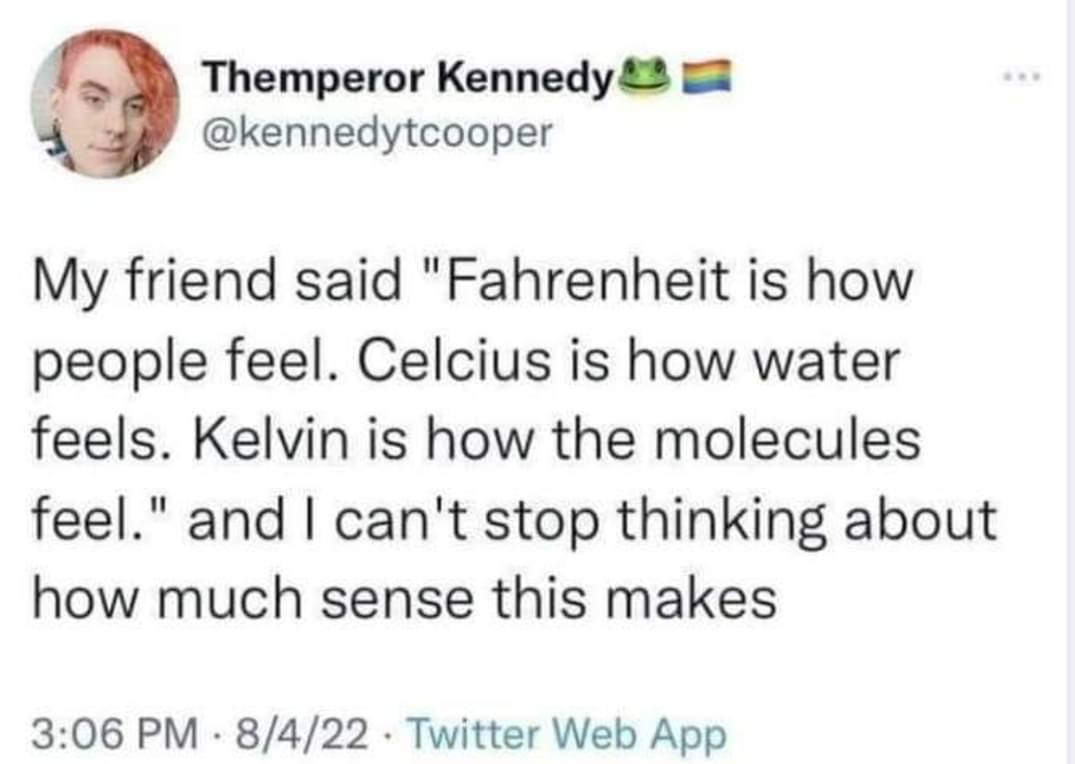this post was submitted on 12 Mar 2024
2 points (53.1% liked)
Science Memes
14949 readers
760 users here now
Welcome to c/science_memes @ Mander.xyz!
A place for majestic STEMLORD peacocking, as well as memes about the realities of working in a lab.

Rules
- Don't throw mud. Behave like an intellectual and remember the human.
- Keep it rooted (on topic).
- No spam.
- Infographics welcome, get schooled.
This is a science community. We use the Dawkins definition of meme.
Research Committee
Other Mander Communities
Science and Research
Biology and Life Sciences
- [email protected]
- [email protected]
- [email protected]
- [email protected]
- [email protected]
- [email protected]
- [email protected]
- [email protected]
- [email protected]
- [email protected]
- [email protected]
- [email protected]
- [email protected]
- [email protected]
- [email protected]
- [email protected]
- [email protected]
- [email protected]
- [email protected]
- [email protected]
- [email protected]
- [email protected]
- [email protected]
- [email protected]
- !reptiles and [email protected]
Physical Sciences
- [email protected]
- [email protected]
- [email protected]
- [email protected]
- [email protected]
- [email protected]
- [email protected]
- [email protected]
- [email protected]
Humanities and Social Sciences
Practical and Applied Sciences
- !exercise-and [email protected]
- [email protected]
- !self [email protected]
- [email protected]
- [email protected]
- [email protected]
Memes
Miscellaneous
founded 2 years ago
MODERATORS
you are viewing a single comment's thread
view the rest of the comments
view the rest of the comments

Guess what, Canada sets the freezer at -15 Celsius. The USDA just chose 0F because it's good enough and a nice easy to remember number, there is nothing special about it.
Same with all your other numbers, your just using whatever the closest even F value is that's easy to remember there's nothing special about any of them and we have equivalents in Celsius
According to Canada.ca
Every 2 F is basically 1 C. You have more whole numbers with F.
Like -15°C is 5°F
6°F is -14.4444°C
-14°C is 6.8°F
So 5, 6, and 7°F are about equal to -15, -14.5, and -14°C.
And it's not just a random number. You know how much more energy would be used if everyone kept their freezer just a couple degrees colder? It's the optimum recommended temperature.
No it's random and arbitrary. Those couple degrees improve shelf life and allow for better extermination of many organisms, and higher temperature gradient allows the water to freeze faster, which is reflected in the quality of the product after thawing as it is less affected by wrongly formed and expanded ice. There is no "golden temperature", and so everyone flips it how they like it, and instead of what's actually right this is often dictated by convenience.
There are strong benefits to keeping your freezer at -80°C (-112°F), even, but at this point it crosses the line of practicality by both freezer cost and electricity consumption.
Also, the whole numbers argument is extemely weird. Like, do you know the difference between 71 and 72°F? Is it pronounced in any way? I can assure you, I cannot tell the difference between 21°C and 22°C. And where it actually matters (precise measurements etc.) you'll need decimals for both (and there's nothing wrong with them!)